The Corporal Works of Mercy
The Corporal Works of Mercy are found in the teachings of Jesus and give us a model for how we should treat all others, as if they were Christ in disguise. They "are charitable actions by which we help our neighbors in their bodily needs" ( USCCA ). They respond to the basic needs of humanity as we journey together through this life.
The seven Corporal Works of Mercy are listed below. After each work of mercy there are also suggestions and words of advice for living them out in our daily lives. Have your own suggestions? Let us know @USCCB and use the hashtag #mercyinmotion .

Feed the hungry
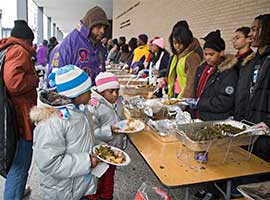
- Having delicious food at Thanksgiving or Christmas dinner? Donate to a Thanksgiving or Christmas food drive so everyone can have something to eat.
- Research, identify and contribute financially to organizations that serve the hungry.
- The next time you make a recipe that can be easily frozen, make a double batch and donate one to your local food pantry or soup kitchen.
- Try not to purchase more food than you are able to eat. If you notice that you end up throwing groceries away each week, purchasing less groceries would eliminate waste and allow you to donate the savings to those in need.
Give Drink to the thirsty
Many of our brothers and sisters in Christ do not have access to clean water and suffer from the lack of this basic necessity. We should support the efforts of those working towards greater accessibility of this essential resource.
- We take it for granted that we have access to clean water. Donate to help build wells for water for those in need
- Organize a group of children involved on a sports team (e.g. soccer) or a summer camp. Invite them to collect bottled water to distribute at a shelter for families. If parents can be involved, ask them to accompany their children in delivering the water to the families.
- Do the same for youth and young adult groups.
- Make an effort not to waste water. Remembering to turn off the water faucet when you are brushing your teeth or washing dishes can help, especially in regions suffering from drought.
Shelter the homeless
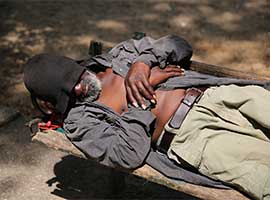
- See if your parish or diocese is involved with a local homeless shelter and volunteer some time.
- Donate time or money to organizations that build homes for those who need shelter.
- Many homeless shelters need warm blankets for their beds. If you can knit or sew that would be an extra loving gift.
- There are millions of children and families who are on the move, fleeing from war, illness, hunger and impossible living conditions, and searching for peace and safety. Engage parish groups of children, youth, young adults, and families in doing some research on the causes and challenges that these families face to survive. Contact Catholic Social Services, or diocesan offices of peace and justice for help with your research. Seek ways to provide shelter for the homeless locally, regionally, nationally or internationally.
visit the sick
Those who are sick are often forgotten or avoided. In spite of their illness, these individuals still have much to offer to those who take the time to visit and comfort them.
- Spend time volunteering at a nursing home – Get creative and make use of your talents (e.g. sing, read, paint, call Bingo, etc.)!
- Take time on a Saturday to stop and visit with an elderly neighbor.
- Offer to assist caregivers of chronically sick family members on a one-time or periodic basis. Give caregivers time off from their caregiving responsibilities so they can rest, complete personal chores, or enjoy a relaxing break.
- Next time you make a meal that can be easily frozen, make a double batch and give it to a family in your parish who has a sick loved one.
visit the prisoners
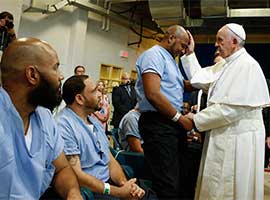
- See if your parish, or a nearby parish, has a prison ministry and if so, get involved.
- Volunteer to help out or donate to charities that give Christmas presents to children whose parents are in prison.
bury the dead
Funerals give us the opportunity to grieve and show others support during difficult times. Through our prayers and actions during these times we show our respect for life, which is always a gift from God, and comfort to those who mourn.
- Send a card to someone who has recently lost a loved one. Make your own card and use some of these prayers .
- Visit the cemetery and pray for those you have lost.
- Spend time planning your own funeral mass, read through the Order of Christian Funerals and find our hope in the Resurrection.
give alms to the poor
Donate money to organizations that have the ability to provide support and services for those in need. Do research and find organizations that put people in need first, rather than profit.
- Skip the morning latte and put that money in the collection basket at church.
- Find a charity that is meaningful to you and volunteer your time or donate.
- This Lent, give up eating out at restaurants. Pack you meals and donate the extra money to charities.
- Participate in CRS Rice Bowl
Confraternity of Our Lady of Mercy
Women and Men Seeking Holiness as the Answer to Abortion
Corporal Works of Mercy: Visit the Sick
November 1, 2015 by Fr. Ben Cameron Leave a Comment
One of the very important Corporal Works of Mercy is to Visit the Sick. How many people are suffering from various illnesses, from cancer, or from accidents today! Many people who are ill suffer from loneliness as well. There are many elderly persons whose families live far away from them. Others have family in the area, but they seldom make the time to visit. It is so easy for us to get so caught up in the busyness of our world today that we forget about those who are suffering from illness — whether they suffer in their own homes, or in a nursing home, or a hospital.
Our Lord Jesus says: “I was ill, and you visited me” to the people that He welcomes into the Kingdom of Heaven (Matthew 25). On the other hand, those who are condemned to eternal damnation are told (among other things), that they did not visit Jesus in the sick. If we wish to be welcomed into the Kingdom of Heaven, it would be a good thing for us to be mindful of those who suffer, and to make time to visit and comfort them.
We have many examples of Saints who excelled in their loving care for the sick and suffering: St. Frances of Rome, St. Elizabeth of Hungary, St. Hedwig, St. Damian of Molokai, St. Marianne Cope, St. Peter Clavier — just to name a few. And who could forget the wonderful example in our own time of Blessed Mother Teresa of Calcutta? These saints give us a wonderful example to follow of always seeing the Lord Jesus in those who are suffering. So, whether we devote our entire lives to the service of the sick, or we simply try to visit them whenever we can, let us always see the Lord Jesus in the suffering faces of His beloved children who are sick and suffering!
Here are a few ideas that we might try during this upcoming Extraordinary Jubilee Year of Mercy:
- Make regular visits to a family member who is ill, home-bound or in a nursing home.
- Get the name of a fellow parishioner who is sick or home-bound, and begin to visit that person regularly. If you don’t know what to say, how about praying with him or her? Or doing some house cleaning for him?
- If you have musical talents, how about using them for providing some entertainment at a nursing home?
- How about bringing children to a nursing home, or to visit a shut-in? The elderly often love to see children, and it is a good thing for children to be mindful of the elderly and their needs.
May the Lord Jesus, who we visit in the sick, bless each of us as we practice this important Work of Mercy!
Leave a Reply Cancel reply
Your email address will not be published. Required fields are marked *
Save my name, email, and website in this browser for the next time I comment.
This site uses Akismet to reduce spam. Learn how your comment data is processed .
- Testimony from a Woman Healed from Abortion
- The Power of God's Mercy to Heal even the Deepest Wounds
- Women of Grace: Part one of interview with Fr. Ben Cameron
Devotional Links
- Chaplet of Divine Mercy
- How to Pray the Rosary
- Miraculous Medal
- The Green Scapular
Post-abortion healing
- Entering Canaan Retreats
- Hope After Abortion – Project Rachel
- Rachel's Vineyard – International Site
- Rachel's Vineyard Kentucky
- Rachel's Vineyard Kentucky Facebook page
- Fathers of Mercy
Posts: Listed by Topics
- Art in Honor of the Unborn (2)
- Latest News (32)
- Liturgical Prayers (3)
- Prayer requests (1)
- Radio/TV interviews (4)
- Reflections from Saints and Holy Persons (34)
- Spiritual Teaching (83)
- Testimonies (4)
- Uncategorized (5)
- Works of Mercy (18)
Post Archives: By Month
Creighton U. Home Page | Creighton's Online Ministries Home Page | Praying Ordinary Time Home Page
Rediscovering the Corporal Works of Mercy Home Page
Email Login
Subscribe to CE (It’s free)
- CE in the News
- Apologetics & Education
- Art & Culture
- Culture of Life
- Food & Travel
- The Blessed Virgin Mary
- Marriage & Family
- Prayer & Spirituality
- Spiritual Warfare
The Mercy of Visiting the Sick
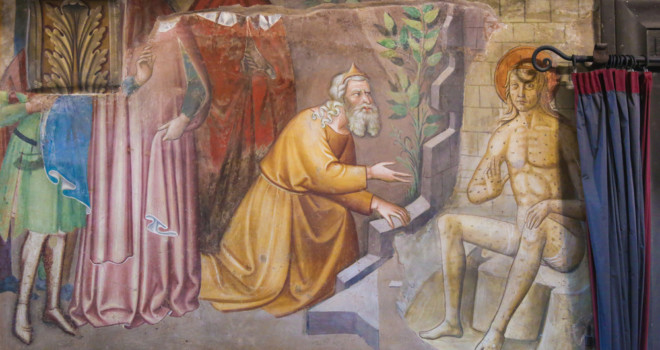
One of the most important works of mercy we can do is to visit the sick. As we are living in a time where there is a movement to euthanize people with chronic illnesses and to encourage them to seek death through physician-assisted suicide, they need to know that their lives have value because they are loved by God. As Catholics, we can witness to God’s love and show people who are sick that we love them too.
In his encyclical, Evangelium Vitae , St. John Paul II explains that the sick need to know people care about them: “The request which arises from the human heart in the supreme confrontation with suffering and death, especially when faced with the temptation to give up in utter desperation, is above all a request for companionship, sympathy and support in the time of trial. It is a plea for help to keep on hoping when all human hopes fail.” ( 67 ) It is our role as Catholics to encourage people who are sick or dying and give them hope.
Unfortunately, some people are uncomfortable visiting the sick and may even avoid visiting their relatives. Perhaps they are afraid of contracting an illness in a hospital or nursing home, or are upset by seeing someone who is suffering, or don’t want to be reminded of their own mortality. Other people may become busy with work or taking care of their family, and think they have no time. Consequently, many sick people are left alone.
My first experience with pastoral care ministry to the sick was while volunteering in a parish in England. A priest asked if I would accompany him on his visits to parishioners who were homebound, in hospitals, and in nursing homes. From Father Liam, I learned how to listen to, talk to, and pray with people suffering from illness and loneliness. Father Liam also taught me to prepare for a visit by prayer, and often prayed the Rosary with me on the way to see the parishioners.
Visiting the sick, one of the corporal works of mercy, can also involve some of the spiritual works of mercy. You may have to counsel a person who is doubtful, instruct a person who is ignorant of God’s love or the value of suffering, or comfort a person who is sorrowful. You will pray for the people you visit while they are living and after they die. Indeed, prayer is the greatest way you will help them.
There are many opportunities to visit the sick. We can visit our relatives, friends, and neighbors with health problems, volunteer for pastoral care ministry in our parish or diocese, or volunteer at a hospital or nursing home. People with dementia are among the most forgotten of the sick. They still need visitors and often respond to people’s kindness. Parishes and dioceses often provide some pastoral care training. It is also helpful to receive training in communicating with people with dementia.
If we know people who are sick who live a long distance from us, we can still show we care by writing cards, letters, and emails, and calling to talk with them. It is important not to make people feel you are doing them a favor by visiting them. Their spending time with us should be seen as a gift. We should ask if it is a good time for a visit and how long they would like us to stay. We should let people who are sick know they are needed. By their prayers and by offering up their suffering to God, they are helping others.
Being present with people in health care facilities can be one of the ways to bring about a culture of life and end the euthanasia movement. Not only will you be giving encouragement to the people with health problems, but you will also give an example of true mercy to the people who work in those facilities, who may not all accept the Church’s pro-life teachings. By our spending time with the patients, it shows that their lives are valuable.
As he related in There Are No Accidents, when Father Benedict Groeschel, CFR was recovering from his accident in 2004, he observed there were many people in the nursing home where he was staying who were all alone and asked: “Wouldn’t it be wonderful if, in our society, it became a custom among Christians to visit one sick person or lonely person in a nursing home or hospital every week?”
Some Suggestions for Visiting the Sick
Before going on a visit, you should pray for the person you will see and ask Mary, who is the Mother of Mercy, to help you during your visit.
You can ask the people you visit if they would like to pray with you, and let them know you are praying for them. When visiting someone who is in the hospital, your visits will usually be short, as they will be resting much of the time. If you visit someone in a nursing home, you may develop a friendship and visit on a regular basis, such as once a week, or more often if the person doesn’t have many visitors. In a nursing home, you may also be able to help the person you visit with non-medical needs such as bringing him to the chapel or outside (if that is allowed by the nurses), or if the person doesn’t see well, reading a book aloud. Catholics with dementia may remember traditional prayers and enjoy praying the Rosary with you.
When visiting someone who is dying, I think it is important to tell the person you are praying for him and remind him of God’s love and mercy. It can be comforting to the dying person to have someone stay quietly in his room, praying. In His revelations to St. Faustina, Jesus recommended the Chaplet of Divine Mercy as a prayer that can bring special graces for people who are dying. With Catholic relatives and friends, we should also ask if they have received anointing of the sick, and if not, help make arrangements for it.
image: jorisvo / Shutterstock.com
By Louise Merrie
Louise Merrie is a freelance writer on Catholic subjects. Her articles have been published in Catholic Life , Novena Magazine , and the Saint Austin Review . She is the founder of the Community of Mary, Mother of Mercy, an organization in which senior priests and Catholic laity support each other through prayer and friendship in living as disciples of Jesus.
Subscribe to CE (It's free)
More on catholic exchange.

Seizing the Day the Christian Way

Overlooking our Infinite Dignity

Jesus’ Eucharistic Humility: Part 1
Go to Catholic Exchange homepage

Adeodatus | The Renewal of Catholic Education feat. Dr. Alex Lessard

The Vocation of Consecrated Virginity | feat. Mary Beth Bracy

Modern Miracles at Lourdes | feat. Marlene Watkins
Most shared.
© Copyright 2024 Catholic Exchange. All rights reserved.
Catholic Exchange is a project of Sophia Institute Press .
Advertise on Catholic Exchange Design by Perceptions Studio .
Privacy Policy
Design by Perceptions Studio .
- Books and Art
- Catechetics
- Dating & Singles
- Faith & Spirituality
- Health & Spirituality
- Marriage & Family
- Media & Culture
- Money & Economics
- Lives of Saints
- Same Sex Attraction
- Science and Discovery
- Featured Essay The Love of God An essay by Sam Storms Read Now
- Faithfulness of God
- Saving Grace
- Adoption by God
Most Popular
- Gender Identity
- Trusting God
- The Holiness of God
- See All Essays

- Best Commentaries
- Featured Essay Resurrection of Jesus An essay by Benjamin Shaw Read Now
- Death of Christ
- Resurrection of Jesus
- Church and State
- Sovereignty of God
- Faith and Works
- The Carson Center
- The Keller Center
- New City Catechism
- Publications
- Read the Bible
- TGC Pastors

U.S. Edition
- Arts & Culture
- Bible & Theology
- Christian Living
- Current Events
- Faith & Work
- As In Heaven
- Gospelbound
- Post-Christianity?
- TGC Podcast
- You're Not Crazy
- Churches Planting Churches
- Help Me Teach The Bible
- Word Of The Week
- Upcoming Events
- Past Conference Media
- Foundation Documents
- Church Directory
- Global Resourcing
- Donate to TGC
To All The World
The world is a confusing place right now. We believe that faithful proclamation of the gospel is what our hostile and disoriented world needs. Do you believe that too? Help TGC bring biblical wisdom to the confusing issues across the world by making a gift to our international work.
Practical Help on a Practical Issue: Visiting the Sick
More by thabiti.

Thabiti Anyabwile (MS, North Carolina State University) is a pastor at Anacostia River Church in southeast Washington, DC. He’s the author of several books, including What Is a Healthy Church Member? , Finding Faithful Elders and Deacons , Reviving the Black Church , and others . He and his wife, Kristie, have three children.
A Burden Removed: A Biblical Path for Removing the Racism of Our Forefathers

Missions and Justice

Reparations Are Biblical

Just Gospel 2020: Pilgrim Politics

Insistence Is Not Evidence: A Final Reply to Tom Ascol

Other Blogs
EWTN News, Inc. is the world’s largest Catholic news organization, comprised of television, radio, print and digital media outlets, dedicated to reporting the truth in light of the Gospel and the Catholic Church.
- National Catholic Register
- News Agencies
- Catholic News Agency
- CNA Deutsch
- ACI Afrique
- ACI Digital
- Digital Media
- ChurchPOP Español
- ChurchPOP Italiano
- ChurchPOP Português
- EWTN News Indepth
- EWTN News Nightly
- EWTN Noticias
- EWTN Pro-life Weekly
- Register Radio
Get HALF OFF the Register!
National Catholic Register News https://www.ncregister.com/blog/5th-corporal-work-of-mercy-visit-the-sick

- Synod on Synodality
- Most Popular
- Publisher’s Note
- College Guide
- Commentaries
- Culture of Life
- Arts & Entertainment
- Publisher's Note
- Letters to the Editor
- Support the Register
- Print subscriptions
- E-Newsletter Sign-up
- EWTN Religious Catalogue
5th Corporal Work of Mercy : “Visit the Sick”

While preparing an article for the next corporal work of mercy (visiting the sick), I immediately thought of one pope who highlighted this practice during his pontificate. That pope was St. John Paul II, who throughout his life emphasized the habit of “visiting the sick.” He is an inspiration to me and challenges us all to renew our own efforts in performing this work of mercy.
John Paul II – Friend of the Sick
As the Archbishop of Kraków, Karol Wojtyła often visited the sick and aging throughout his diocese. He saw being present to those who were suffering as a central part of his ministry and believed that their prayers and sacrifices gave him vitality. After celebrating Mass at the chapel of the Daughters of Charity of St. Vincent de Paul in Kraków, Archbishop Wojtyła visited those in the infirmary where he said to them:
“ Although I am young and strong, although I fly in airplanes, climb mountains, ski, I still turn to the weakest , so that by the riches of their suffering they may bring down the strength and power of the Holy Spirit and the blessing of God upon my work in the Archdiocese” ( Making Of The Pope Of The Millennium: Kalendarium of the Life of Karol Wojtyla )
After being elected pope, John Paul II’s first trip outside the Vatican was to visit one of his good friends at the Gemelli hospital recovering from a massive stroke. During his short visit John Paul II spoke to the patients and asked for their prayers. He later recalled:
“I said to the patients that I counted greatly, very greatly indeed, on them: for their prayers and especially for the offering of their sufferings, which could provide me with a special strength, a strength that was and is necessary to me in order to perform in a less worthy manner my serious duties in the bosom of the church of Christ” ( Saint John Paul the Great: His Five Loves )
John Paul II frequented Gemelli throughout his pontificate both as a visitor and as a patient. He even jokingly called the hospital his third papal residence, “Vatican III.”
While on a papal trip to Nigeria in 1982, John Paul II visited a hospital where he spoke words of comfort to the sick and related his own experience being in a hospital:
“Although God allows suffering to exist in the world, he does not enjoy it. Indeed, our Lord Jesus Christ, the Son of God made man, loved the sick; he devoted a great part of his earthly ministry to healing the sick and comforting the afflicted. Our God is a God of compassion and consolation.
I also know personally what it means to be sick and to stay in hospital for a long time, and how it is possible to comfort and support others who share the same lot of confinement and suffering, and how necessary it is to pray for the sick and to show them one’s loving concern ( Address in St. Charles Borromeo Hospital ).
We all know what it feels like to be sick and at home or in a hospital. It is isolating and often very painful. The presence of visitors can often lift-up the heart of a patient and remind them that they are not alone.
The need for visitors is at its highest during the Christmas season. During a time when families get together in their homes to celebrate the birth of Christ, thousands of individuals are confined to hospital beds or nursing homes and feel most alone.
The challenge for us is to get outside of our comfort zone and do something for others, the weakest, and most vulnerable of society.
Let us ask for Saint John Paul II’s intercession this Christmas season so that we can have the courage to visit the sick and imitate his example of Christ-like love.
Philip Kosloski Philip Kosloski graduated from the University of Saint Thomas in Minnesota with a Bachelor’s in Philosophy and Catholic Studies and completed his Master of Arts degree in Theology with the Augustine Institute. He is a writer and author of In the Footsteps of a Saint: John Paul II's Visit to Wisconsin . He blogs at philipkosloski.com and writes to help all Catholics master the art of prayer by conquering the practical obstacles that prevent a fruitful relationship with Christ.
- Related Stories
- Latest News

Why Families (and Parishes) Love These Sacramental Preparation Kits
The catechetical boxes have been described as a cross between Montessori (hands-on learning) and Pottery Barn (high-quality home décor).

St. John Henry Newman, Adam Smith and Conscience
COMMENTARY: Has our inner voice discerning between right and wrong gone silent?

Hong Kong Criticizes US Bill to Rename Street in Honor of Imprisoned Human-Rights Defender
Reps. Chris Smith, R-N.J., and Tom Suozzi, D-N.Y., proposed a bill to rename the address of the Hong Kong Economic Trade Office in Washington, D.C., ‘Jimmy Lai Way.’

Chaplains in Public Schools? Florida’s Catholic Bishops ‘Pleased’ By New Law
Gov. Ron DeSantis, who signed the bill two weeks ago, said some school districts in Florida are already hosting chaplains.

St. Marie of the Incarnation, Pray for Us!
SAINTS & ART: Strong-willed women like Mère Marie, committed to God, played critical roles in Canadian Catholic history.

14 More Church Fathers vs. Faith Alone
‘The disciple of Christ must not only keep the faith and live on it, but also profess it, confidently bear witness to it, and spread it.’ (CCC 1816)

Former Anglican Vicar Becomes First Bishop of UK Ordinariate
Msgr. Newton said in a statement that he was ‘delighted’ with Father Waller’s appointment, adding that he has been ‘unwaveringly loyal’ to the Ordinariate and a ‘great support’ to him as vicar general.

Deliverance From the 1960s Lust Revolution, Spiritual Abusers, the Truth About Confirmation, and More Great Links!
The Best In Catholic Blogging
Renewing Liturgical Music: Catholic Sacred Music Project Shares Beauty of the Eternal
When dead doesn’t mean dead: protecting the vulnerable during organ donation, ‘st. gianna is very close to our hearts’: lives changed through saint’s intercession, discover the hidden chapel in rome where st. catherine of siena died, spanish bishop to biden: invoking jesus christ in support of abortion is a sacrilege, pennsylvania priest spent $41k in parish funds on cellphone games, police say, the reason of mary wollstonecraft: championing women and their moral formation, miami archbishop slams biden for ‘unconscionable’ deportation of haitian refugees, subscription options.

Subscriber Service Center Already a subscriber? Renew or manage your subscription here .
Subscribe and Save HALF OFF! Start your Register subscription today.
Give a Gift Subscription Bless friends, family or clergy with a gift of the Register.
Order Bulk Subscriptions Get a discount on 6 or more copies sent to your parish, organization or school.
Sign-up for E-Newsletter Get Register Updates sent daily or weeklyto your inbox.
You are using an outdated browser. Please upgrade your browser to improve your experience.
Mayo 01, 2024
- Abril 30, 2028
- Abril 29, 2024
- Gospel Germs
- Tanka Testament
April 28, 2024
- Abril 28, 2024
- April 27, 2024
CORPORAL WORKS OF MERCY: to visit the sick
Some people are terrified of hospitals. Others simply fear pain and the prospect of their own diminishment. We just do not want to think about it. None of us – unless we are masochists – welcomes suffering and death. Jesus himself was afraid of death in the Agony in the Garden. He was not ‘going through the motions’. If the Lord can be afraid, then it is OK for us, too.
This acceptance of creaturehood, the coming to peace with our human finiteness and vulnerability, is an important journey that we must all undertake. But it is a task we cannot do alone. We need support.
Do not expect much of it from our culture. Our society cherishes fantasies of eternal youth and conveniently airbrushes sickness and death from the ‘good’ life. The aged are hidden away in institutions; disabled and terminally ill are not seen as ‘productive’, and hence are devalued. Many sick people experience the loneliness of abandonment from relatives and others who do not want to be reminded of their own mortality.
Christ calls us to ‘visit the sick’ and care for them as an essential part of our Christian mission of love and compassion. Hence the crucial role the Church played in establishing hospitals and the critical role it still plays in health care in most countries. Thank God for our Catholic hospitals, and indeed for most hospitals, where the medical profession generally selflessly ministers Christ’s healing power and love to so many.
But we cannot leave all the support needed to these wonderful professionals. There is something about personal contact with sick people that we need to be fully alive in the Spirit.
Daniel Berrigan SJ once wrote a tender and poignant account of such personal service – working as an orderly in St Rose’s Cancer Hospital in New York (We Die Before We Live; Talking with the Very Ill, Seabury, NY, 1980). St Rose’s exists solely for the poor who cannot afford cancer treatment. It takes no state money, instead surviving on providence alone. Fr Berrigan contrasts the quality of human care offered in this extraordinary Catholic hospital with the soulless bureaucracy of some other institutions.
In characteristically lyrical terms he meditates: “To grasp something of this, one has to go beyond therapeutic convention. Even if the staff saw the hospital as a kind of mini-Titanic heading towards catastrophe (and they do not), it still must be reported that there are no ‘social facilitators’ aboard. People are employed or volunteer, not to daub a presentable cosmetic on the hard face of death, or to whoop things up despite all. We are there to help make life bearable, to make some sense of it, make it attractive as long as it lasts – together. There is respect for privacy, respect for moods and imbalances, a spoiling attention to diet. There is an unobtrusive religious feel about the place, which now and again surfaces in sacrament or prayer or plain talk about death; but only on the initiative of the patients. No one is force fed, whether on religion, psychosemantics or – antics. Little account is taken, except where suffering or depression require, as to being in our purported stages of dying.”
What matters for Fr Berrigan and for all who minister to the sick then is presence. Often we cannot take away the pain. Words fail us. But our humanity under the power of the Holy Spirit quietly tells us inside simply to be there for others.
Another Jesuit, Teilhard de Chardin, has a prayer well worth making our own. It has inspired many to visit Christ in our brothers and sisters and be more fully present to them. The sick need such support badly. And one day we will too. ▪
PRAYER FOR THE GRACE TO AGE WELL
When the signs of age begin to mark my body (and still more when they touch my mind); when the ill that is to diminish me or carry me off strikes from without or is born within me; when the painful moment comes in which I suddenly awaken to the fact that I am ill or growing old; and above all at that last moment when I feel I am losing hold of myself and am absolutely passive within the hands of the great unknown forces that have formed me; in all those dark moments, O God, grant that I may understand that it is you (provided only my faith is strong enough) who are painfully parting the fibres of my being in order to penetrate to the very marrow of my substance and bear me away within yourself.
—Teilhard de Chardin SJ
think about it Sickness can come in many guises – physical, mental and emotional. Not all the sick are ‘in care’. Identify ‘the sick’ amongst your family, friends and community. How are you a loving presence for them? Most suburbs have hospitals, aged care and assisted living facilities. Identify those in your area. Is there a volunteer visitors program you may be able to join? Alternatively, ask if there is one lonely patient who would appreciate ongoing contact? What images most challenge you in the beautiful prayer by Teilhard de Chardin? Can you make this prayer your own?
Post credit:
about this resource AN OPPORTUNITY FOR INDIVIDUAL & GROUP REFLECTION
This article is taken from a booklet which contains a series of articles written by Br Mark O’Connor FMS, originally published as part of his regular column ‘Spirit is Moving’ in Kairos Catholic Journal. They are provided here as a source of reflection as we journey through the Season of Lent in this Year of Mercy. Each article is a reflection on the Corporal and Spiritual Works of Mercy, which originate from the Tradition of the Church dating back to post-middle ages. They are meant to be visible signs of God’s mercy and compassion at work in the world.

Lenten Resolutions For Married Couples, Inspired by Pope Francis
Gospel: march 19, 2016, related articles.

The Corporal Works of Mercy: to give drink to the thirsty

To Feed the Hungry
Pang araw-araw.
Unang Pagbasa: Gen 1: 26 — 2: 3Ebanghelyo: Mt 13: 54-58 Pumunta siya sa kanyang bayan at nagturo sa mga… Read more...
THOUGHT FOR THE DAY
John 15:1-2 - I am the real vine “I am the real vine and My Father is the gardener. He… Read more…
GOSPEL GERMS

TANKA TESTAMENTS

MARY’S MISSION
Generals are Gentle Graces, Too
Read article…
Not Just Ang Senior Life
The Immaculate Conception of the Blessed Virgin Mary

FILM REVIEW
“A THOUGHT-PROVOKING MOVIE ABOUT THE POWER OF FAITH”

17th Cardinal Sin Catholic Book Awards
WORD CONFERENCE 2023
CCFI AWARDS
2014 Copyright. Claretian Communications Foundation Inc
Advertisement
Free Newsletters
Sign up now

Help us raise $225,000 for NCR!
We have raised $1,929 from 15 supporters. We are .85% of the way to our goal!
Corporal Works of Mercy: Visit the sick
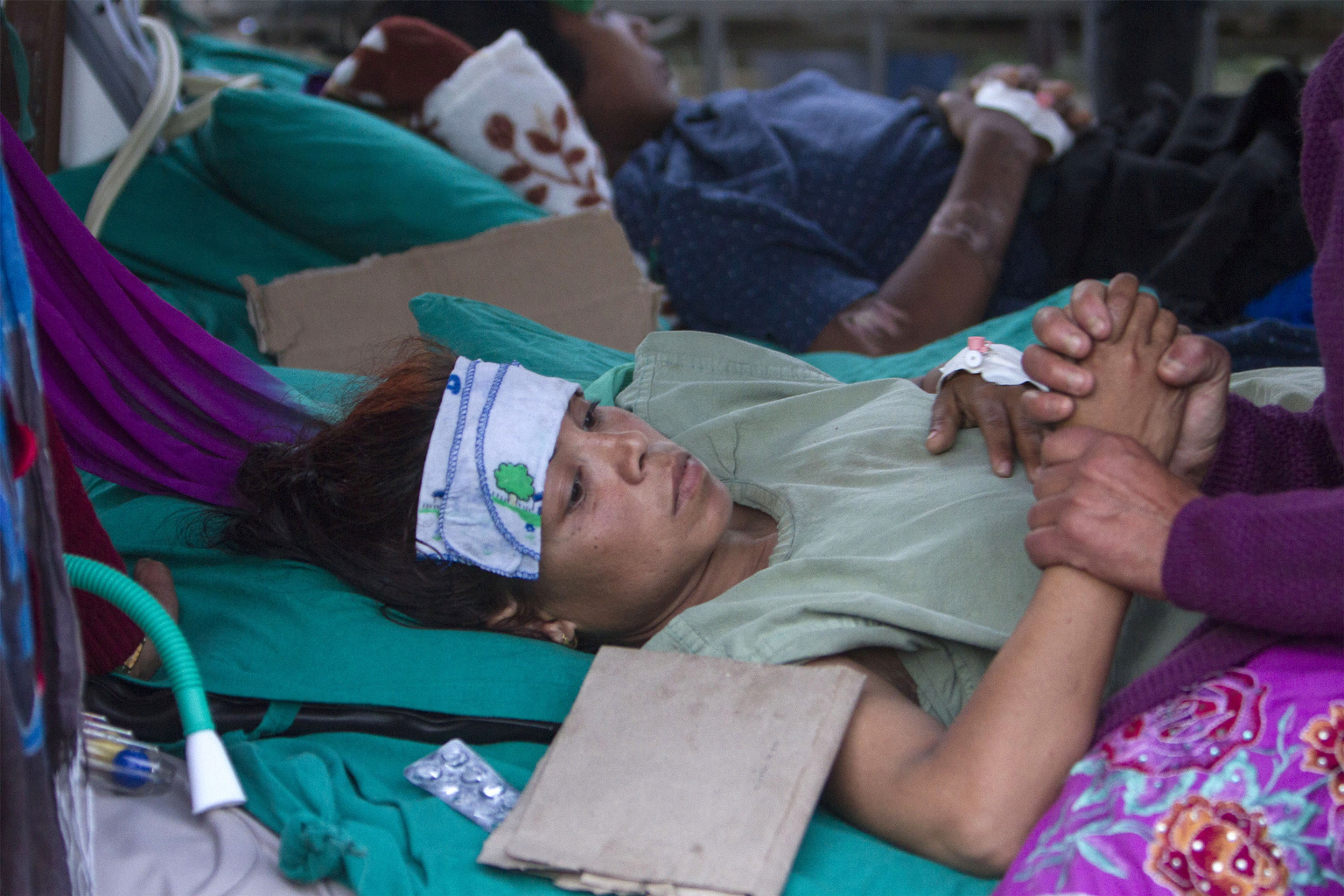
A visitor comforts a young earthquake victim outside a hospital in Kathmandu, Nepal. (CNS/Hemanta Shrestha, EPA)
by NCR Staff
View Author Profile
Join the Conversation
It's not always easy to be a caregiver and bring a hint of heaven -- peace, love, wholeness and assurance -- into other people's homes. Sometimes the old and ill grow mean, or their spouses or adult children turn the simplicity of caring into drama. Their fears prevent them from knowing that when you help someone, your left hand must not think about what the right is doing (Matthew 6:3).
– Michael Leach
How and when have you visited the sick? Please email us your stories and images or leave a comment on our Instagram account .
Stories on visiting the sick:
LGBT-friendly parish has long history of ministry to homeless, sick
The surprising grace of Alzheimer's; even those who aren't caregivers can benefit from author's insights
Pope’s Quotes: Illness
Global Sisters Report:
Inter-Mission: Life between cancer remissions
Sr. Julia Thundathil serves people with Hansen's disease, discarded from family, ostracized
Q & A with Sr. Lisha Chiramattel, healthcare provider for underprivileged and remote tribe in East India
Sisters' clinic sets model of treatment in Vietnam
Battle with malaria epidemic shaped career of Mercy Sister who is doctor
Sisters assist migrant workers struck by HIV/AIDS
Sister with dual calling provides pediatric health care to impoverished families
Latest News

Pope responds with 'open heart' to Vatican document criticism from parents of LGBTQ children
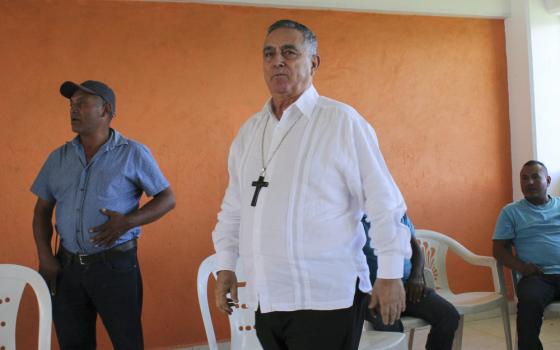
Abducted retired Catholic bishop who mediated between cartels in Mexico is located, hospitalized
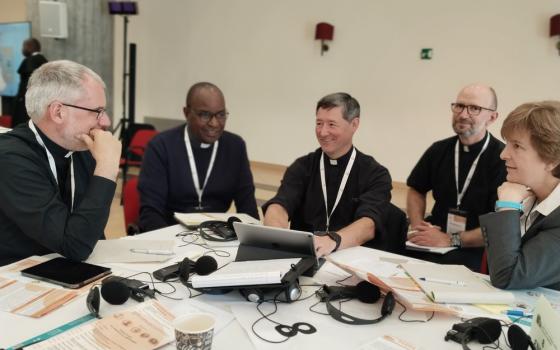
Global group of pastors looks at parishes, synodality and mission

Sr. Teresita Weind, tireless advocate for Black sisters, dies at 81
Subscribe to ncr's free newsletters.
Select any of the newsletters below, then enter your email address and click "subscribe"
- Asia - Pacific
- Middle East - Africa
- Apologetics
- Benedict XVI
- Catholic Links
- Church Fathers
- Life & Family
- Liturgical Calendar
- Pope Francis
- CNA Newsletter
- Editors Service About Us Advertise Privacy

Pope Francis: Visiting the sick is a Christian imperative

By Hannah Brockhaus
Vatican City, Jan 4, 2022 / 05:05 am
In a message ahead of the World Day of the Sick, Pope Francis reminded Catholics that caring for the ill and infirm is not the calling of a few, but part of every Christian’s mission to show mercy.
“I would like to remind everyone that closeness to the sick and their pastoral care is not only the task of certain specifically designated ministers; visiting the sick is an invitation that Christ addresses to all his disciples,” the pope said .
“How many sick and elderly people are living at home and waiting for a visit,” he added. “The ministry of consolation is a task for every baptized person, mindful of the words of Jesus: ‘I was sick and you visited me.’”
The Catholic Church will mark the 30th annual World Day of the Sick on Feb. 11, the Feast of Our Lady of Lourdes. The Sanctuary of Our Lady of Lourdes in southwestern France is associated with the sick because of the presence of a miraculous spring from which many people have obtained physical healing.
Pope Francis said that his predecessor John Paul II instituted the World Day of the Sick in 1992 as a way “to encourage the people of God, Catholic health institutions, and civil society to be increasingly attentive to the sick and to those who care for them.”
In his message, Francis focused on mercy in light of this year’s theme: “‘Be merciful, even as your Father is merciful’ (Luke 6:36): Standing beside those who suffer on a path of charity.”
God’s mercy “combines strength and tenderness,” he said, and “the supreme witness of the Father’s merciful love for the sick is his only-begotten Son.”
How many sick and elderly people are living at home and waiting for a visit! The ministry of consolation is a task for every baptized person, mindful of the word of Jesus: “I was sick and you visited me” (Mt 25:36). https://t.co/gDmmzxxVll — Pope Francis (@Pontifex) January 4, 2022
Pope Francis, who spent 10 days in hospital last July after colon surgery, pointed out Jesus’ great concern for the sick and suffering during his earthly ministry. Jesus encountered many people suffering from disease and he performed miracles of healing.
It is a good idea for us to ask ourselves why Jesus showed such concern, the pope said, noting that one reason may be the loneliness that people can feel when they are sick or in pain.
Quoting the 20th-century French philosopher Emmanuel Lévinas, the pope said: “Pain isolates in an absolute way, and absolute isolation gives rise to the need to appeal to the other, to call out to the other.”
Jesus, Francis said, invites everyone — from physicians and nurses to laboratory technicians, support staff, and other caretakers — to show mercy toward those who are unwell.
While we thank God for the wonderful advances in medical science and technology, we must never forget “the uniqueness of each patient, his or her dignity and frailties,” he urged.
“Patients are always more important than their diseases, and for this reason, no therapeutic approach can prescind from listening to the patient, his or her history, anxieties and fears,” he wrote.
The pope also emphasized the importance of protecting and preserving Catholic healthcare institutions.
“Their presence has distinguished the history of the Church, showing her closeness to the sick and the poor, and to situations overlooked by others,” he wrote.
Pope Francis created a foundation in October offering financial support to Catholic hospitals in difficulty. The foundation, known in Italian as the Fondazione per la Sanità Cattolica, was established in response to requests for “direct intervention” by the Vatican to help Catholic institutions.
More in Vatican


Pope Francis to Regnum Christi: May the Spirit help you to make ‘mystery of Christ’ present
On Dec. 24, it was announced that the new Vatican foundation had joined together with the Leonardo Del Vecchio Foundation to save and relaunch Rome’s historic Fatebenefratelli Hospital, which has been in dire financial straits since 2013.
The nearly bankrupt Catholic hospital on Rome’s Tiber Island is run by the Hospitaller Order of St. John of God.
Catholic healthcare is important both in poor countries, where people lack access to adequate care, and in the most developed countries, Pope Francis said, where, “in addition to caring for the body with all necessary expertise, they can always offer the gift of charity, which focuses on the sick themselves and their families.”
“At a time in which the culture of waste is widespread and life is not always acknowledged as worthy of being welcomed and lived, these structures, like ‘houses of mercy,’ can be exemplary in protecting and caring for all life, even the most fragile, from its beginning until its natural end,” he said.
Francis closed his message by entrusting all of the sick and their families to the intercession of the Virgin Mary, under the title Health of the Infirm.
“United with Christ, who bears the pain of the world, may they find meaning, consolation, and trust. I pray for healthcare workers everywhere, that, rich in mercy, they may offer patients, together with suitable care, their fraternal closeness,” he said.
- Catholic News ,
- Catholic Health Care ,
- World Day of the Sick ,
- Pope Francis ,
- Catholic Church ,
- Vatican news

Subscribe to our daily newsletter
Our mission is the truth. join us.
Your monthly donation will help our team continue reporting the truth, with fairness, integrity, and fidelity to Jesus Christ and his Church.
You may also like

Pope Francis thanks sick and elderly priests for proclaiming Gospel of life
Pope Francis thanked sick and elderly priests for their quiet witness to the Gospel Thursday in a message that conveyed the sanctifying value of frailty and suffering.

Pope Francis: Serve the sick with generosity
To serve the poor and sick in a generous manner is a powerful form of evangelization, Pope Francis said Tuesday in a message for the upcoming World Day of the Sick.

Mercy Friday: Pope makes surprise visit to residence centers for the sick
Continuing his ‘Mercy Friday’ initiative, Pope Francis visited two live-in health centers in the far southern suburbs of Rome today, where he spoke with residents and gifted a 22-pound Christmas cake.
- Interlinear
- More ▼
6 Bible Verses about Visiting Of The Sick
Most relevant verses.
naked, and you clothed Me; I was sick, and you visited Me; I was in prison, and you came to Me.’
Pure and undefiled religion in the sight of our God and Father is this: to visit orphans and widows in their distress, and to keep oneself unstained by the world.
So King Joram returned to be healed in Jezreel of the wounds which the Arameans had inflicted on him at Ramah when he fought against Hazael king of Aram. Then Ahaziah the son of Jehoram king of Judah went down to see Joram the son of Ahab in Jezreel because he was sick.
When Elisha became sick with the illness of which he was to die, Joash the king of Israel came down to him and wept over him and said, “My father, my father, the chariots of Israel and its horsemen!”
Now when Job’s three friends heard of all this adversity that had come upon him, they came each one from his own place, Eliphaz the Temanite, Bildad the Shuhite and Zophar the Naamathite; and they made an appointment together to come to sympathize with him and comfort him.
Is anyone among you sick? Then he must call for the elders of the church and they are to pray over him, anointing him with oil in the name of the Lord;
Bible Theasaurus
- Sick ( 138 instances )
- Visiting ( 18 instances )
Related Topics
- Love To Others Shown In
- Love, For One Another
- People Visiting
- Shepherds, As Church Leader
- 3 more topics on Visiting
- 4 more topics on Sick
Never miss a post
Related Readings
New American Standard Bible Copyright ©1960, 1962, 1963, 1968, 1971, 1972, 1973, 1975, 1977, 1995 by The Lockman Foundation, La Habra, Calif. All rights reserved. For Permission to Quote Information visit http://www.lockman.org
- All Translations (Parallel)
- NASB New American Standard Bible
- KJV King James Version
- HCSB Holman Bible
- ISV International Standard Version
- YLT Youngs Literal Translation
- Darby Darby Translation
- ASV American Standard Version
- WBS Webster
- NET NET Bible
- AMP Amplified
- LEB Lexham Expanded Bible
- WEB World English Bible
- WE Worldwide English (NT)
- EMB The Emphasized Bible
- BBE Bible in Basic English
- WNT Weymouth New Testament
- KJ2000 King James 2000
- AUV An Understandable Version
- MSTC Modern Spelling Tyndale-Coverdale
- MKJV Modern King James verseion
- JuliaSmith Julia Smith Translation
- Godbey Godbey New Testament
- ACV A Conservative Version
- NHEB New Heart English Bible
- Mace Daniel Mace New Testament
- Wesley John Wesley New Testament
- Worsley Worsley New Testament
- Haweis Thomas Haweis New Testament
- Diaglott Emphatic Diaglott Bible
- LOV Living Oracles New Testament
- Sawyer Sawyer New Testament
- ABU American Bible Union New Testament
- Anderson Anderson New Testament
- Noyes Noyes New Testament
- TCV Twentieth Century New Testament
- Worrell Worrell New Testament
- Moffatt Moffatt New Testament
- Goodspeed Goodspeed New Testament
- MNT Montgomery New Testament
- Williams Williams New Testament
- Common Common New Testament
- What Is the Alliance?
- Cambridge Declaration
- Alliance Leadership
- How to Join the Alliance
- Alliance Member Churches
- Reformation Societies
- Place for Truth
- Reformation 21
- Alliance Podcast Network
- The Bible Study Hour
- Dr. Barnhouse & the Bible
- Every Last Word
- Hear the Word of God
- Kids Talk Church History
- Mortification of Spin
- Theology on the Go
- Where to Listen
- Blogging The Institutes
- Matthew Henry
- Reading with M’Cheyne
- Think and Act Biblically
- Through the Westminster Confession
- Philadelphia Conference on Reformed Theology
- B.B. Warfield Memorial Lecture Series
- Blue Ridge Institute for Theological Education
- Gap Center for Biblical Studies
- Pensacola Theological Institute
- Quakertown Conference on Reformed Theology
- Reformed Events
- Alliance Apps
- International Council on Biblical Inerrancy
- Reformed Resources

The Blessing of Visiting the Sick
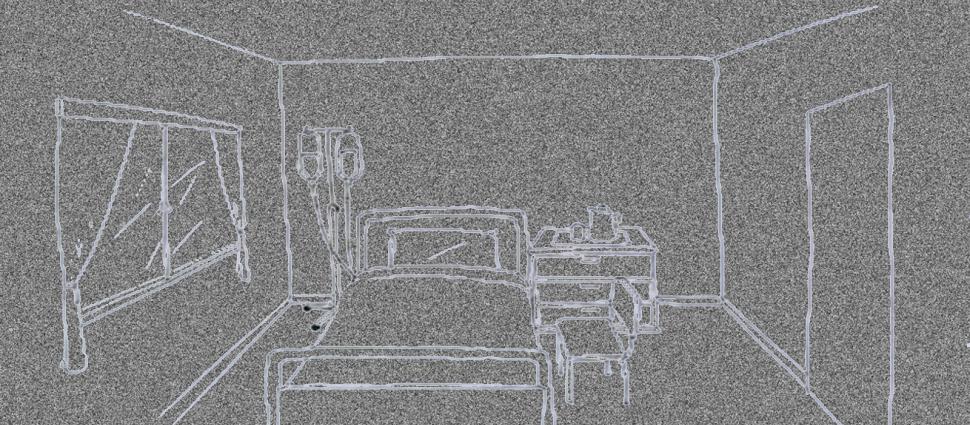
In 1892, John D. Wells delivered three lectures at Princeton Theological Seminary that were transcribed and subsequently published in a little booklet titled, The Pastor in the Sickroom . This book is one of those unique little volumes that every man preparing for ministry should read. It is also one of those volumes that every minister should read through several times throughout his ministry. Sadly this is one area of ministry has received very little attention throughout church history.
I am writing this post because, over the past three weeks, I have spent more time at various hospitals (visiting congregants and the family members of congregants) than I have spent in almost every other year of ministry combined. It has been one of those seasons in which it seems as though everyone is getting sick all at the same time. The sickness of beloved congregants and their loved ones is one of the things that is often far from the mind of those of us entrusted to preach the Gospel. We have our plans, our agendas and our goals--reading, prayer life, teaching, preaching, outreach, writing, hospitality, exercise, family time, etc.--and visiting the sick usually does not factor into what we have planned for ourselves in ministry; nevertheless, visiting the sick is one of the greatest privileges and blessings of pastoral ministry. While there are many other benefits that accrue from pastoral visitation of the sick, here are three benefits of which I am reminded when I am carrying out pastoral visitation to the sick:
1. God calls us to be servants. Visiting the sick and the dying reminds us that we have been called by God to be servants to those in need. There is no glory in the hospital room. There is no public adulation--no praise of man by the bedside of the sick. There is no room for boasting when you are sitting by the side of those who are fearful for the outcome of their sickness. There is no place for self-promotion in the public square. Ministers--especially those gifted in preaching, teaching and writing--need this reminder. Your gifts may by praised by those who see you in the pulpit, but are hidden from the public's site in the sickroom. Our Savior spent a large portion of His earthly ministry in the presence of the sick--healing and comforting those who were experiencing the misery of life. He who did not come to be served but to serve and to give His life a ransom for many, teaches his ministers to also serve those He came to redeem.
2. Our lives are all exceedingly fragile. One of the unexpected benefits of visiting the sick is that we are reminded of the frailty of our own lives--not only of those whom we visit. Whenever I am in the hospital, I am reminded of the brevity of my life and of the many infirmities with which I am subject to on account of the fall of our first parents. While the minister goes to care for those in their hour of need with prayer and the Scriptures, he is often the recipient of the blessing of being reminded of his own frailty and the brevity of his own life. I often picture myself in a hospital bed and am grateful that the Lord brings to mind that I am only dust and ashes.
3. We are utterly dependent on the Lord. Whenever I visit those with serious health issues, I realize anew that I am utterly dependent on the Lord to heal those at whose bedside I am sitting. No amount of training, compassion, empathy, knowledge of Scripture, prayers, etc. will bring the healing that God alone can give. He certainly appointed prayer and the word as means of healing our spirits and bodies, but has not promised to answer every prayer according to our petitions. Our compassion and empathy may provide momentary help to those who are sick, but it is no means of healing physical infirmities. Only the Lord, in His wisdom and mercy, can heal those who are sick. The same principle is true in preaching; however, I find it to be more easily seen in those moments of mental and physical infirmity. We see this played out in the account of Jesus healing the demon-possessed, convulsing boy (Luke 9:37-42). When Jesus was up on the mount being transfigured, several of the disciples were at the foot of the mountain attempting to heal this man's son. After Jesus had come down, the boy's father said, "I implored Your disciples to cast it out, but they could not." Jesus then healed the boy and said, "This kind can come out by nothing but prayer and fasting.” The point is simple: Only God has the power to heal the sick. We must learn to utterly depend on Him and His sovereign will when we are visiting the sick.
While it is the duty of all Christians to visit the sick, it is especially the responsibility of elders and deacons in Christ's church. As we seek to fulfill our Lord's call for us to care for those with mental illness or who are in physical distress, may we also see His hand of providence in bringing to our minds the valuable lessons He is seeking to teach us. There is a reciprocal benefit to pastoral visitation of the sick when we do so with an eye to God's sovereignty and the biblical truth about ourselves. When we purpose to visit those with physical infirmities in order to call on the Lord for them, to bring them the precious truths of His word and to walk beside them with compassion and empathy, the sick are comforted, we are edified and God is glorified. May the Lord give us grace to enter in on this work willingly and joyfully, knowing that our God has called us to do so.
MORE FROM THE ALLIANCE

REFORMATION 21
Plundering the pagans: reformed....

SEEN & HEARD
Mortification of spin releases its 500th episode.

MORTIFICATION OF SPIN
Critical dilemma.

- Audio Gallery
- Camillian calendar
- Camillian Task Force
- Camilliani Camillians
- Document Centre
- Festa di San Camillo – Bucchianico
- Festa di San Camillo alla Maddalena
- Health and Development
- Health Care
- Initiatives for the IV Centenary
- International Lay Camillian Family
- Natale a Taiwan
- Old Things and New Things
- Photo Gallery
- Prayer to Saint Camillus for the Fourth Centenary
- Privacy & Cookies
- Reserved Area
- Saints and Blessed
- Send a prayer to St. Camillus
- The Camillian Publishing House
- The Camillian World
- The First Years
- The Heritage
- The identity card
- The Lay Camillian Family
- Testi Essenziali
- The Founder
- A Short History of the Order
- Basic values
- The General Consulta

Ministers of the Infirm
Camillian religious.

Visiting the sick
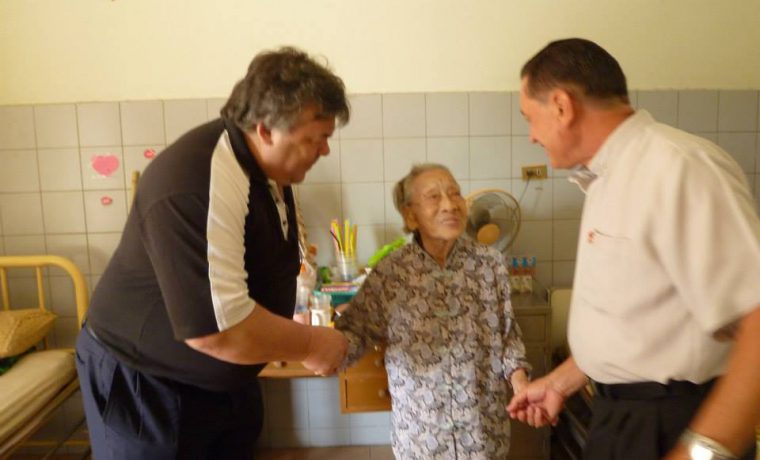
The very term ‘ misericordia ’ (‘mercy’) already tells us that we are called to engage in compassion and tenderness and to care about the misery, the pain or the loneliness of those whom we visit. We are offered a concrete example of this by Mary who hurries to visit her cousin Elisabeth who needs help because she will shortly give birth to a child. For this reason, Mary goes on a long and arduous journey that takes her from Galilee to the distant mountainous region of Judea. Generously ready to perform all those intimate and familial acts of help that are needed when a child is born, Mary stays with Elisabeth for three months in an atmosphere of joy, of celebration, but also of trepid waiting; singing and dancing for the Lord. And while she narrates the wonders that God has done in her, there springs up from her heart that splendid song of praise, the Magnificat (Lk 1:39-56). Thus when the Church invites us to visit the sick, after a certain fashion she exhorts us to imitate not only the example of Mary but also, and above all else, the example of Jesus who often visited homes that were marked by pain, by mourning or by illness. He certainly had the power to heal every kind of infirmity; we, on the other hand, have the power to visit, to comfort, to share pain or loneliness, to lighten the burdens of those who weep or suffer in body or spirit. This is a visit, therefore, that must be transformed into an act of love, of nearness and of support in moments of sadness and dismay, privileging in our visits not many words but attentive and empathetic listening, above all helping the sick person to free himself from tensions, doubts, remorse and hidden bitterness. Our parishes are for the most part populated by elderly people, most of whom are not self-sufficient, by disabled people, the mentally ill, or cancer patients who are nearly always frightened or terrorised by the bad events that could befall them. We Christians cannot leave them on their own; they are our brothers and sisters, members of one body which is the Church, and in this body the law of solidarity is in force: ‘if one member suffers, all the members suffer together (1Cor 12:12-31).
These visits should, therefore, be made with joy and a smiling face, trustingly waiting to receive one day the happy declaration of Jesus, the good judge: ‘well done good and faithful servant…Come on in and share my happiness…I was sick and you took care of me’ (Mt 25:23, 36). I cried in my despair and you were near to me with so much delicacy, with small gestures of affection, of support and of comfort, such as to infuse courage and hope in me. But the good judge could also say to us: I was sick for years in the street where you lived, or in the neighbourhood next to your parish, but you lived as though I did not exist. I never saw you, I do not know you; unfortunately you will never be able to enjoy the joy of your Lord. Only eternal punishment awaits you (Mt 25:31 -45). To avoid this irremediable calamity, both in the Old Testament and in the New Testament the Lord continues to exhort us not to be selfish or deaf to calls for help, as we can see from the words of Sirach: ‘Show sympathy to those who have lost a loved one, and mourn with them. Do not hesitate to visit the sick. You will be loved for things like this’ (7:34-35). Therefore a visit that is caring and cordial can be transformed into a mysterious but real encounter with Christ who is present in the sick person, and in his turn it is Christ who will visit us in the person of that sick man or woman. Lastly, another wonderful statement is that of St. James who defines charity as the heart of the gospel: ‘What God the Father considers to be pure and genuine religion is this: to take care of orphans and widows in their suffering and to keep oneself from being corrupted by the world’ (Jas 1:27).
The posture of the person who helps must be correct; one cannot keep standing looking at the patient from above – one must place oneself at the level of his eyes, in order to communicate comfortably with him. A visit, in addition, is not only made up of words – it is also made up of silences, of looks, of prayer, and of listening, trying to understand the non-verbal messages that the sick person transmits to us as well. In more serious situations one can communicate with one’s eyes, with one’s hands, with a look, and with touch. Nor can we address banal words to the patient, for example: ‘you’ll see, you’ll soon be back home’ if he is in a hospital and in a very bad way, or ‘you look better’, while when we have gone out of the room we comment in a very different way: ‘did you see how bad he was?’; ‘poor man, he has not got much time to live’; or we utter phrases that shut down the insistent questions of the patient: ‘but what are you saying, don’t say such things’. In all these situations, a sick person sees his visitors as enemies, he senses their duplicity and falsehood, and for this reason he becomes depressed and gets irritated, like Job did. After making these necessary clarifications, not to discourage but to emphasise at a deeper level the fertile but also risky meaning of a visit to the sick, I will end with a splendid beatitude addressed by St. Camillus to those who visit or help the sick with the heart of a mother: ‘Blessed and happy will you be if you can be accompanied to the tribunal of God by a tear, a sigh, of these sick poor people, because you will enjoy Him eternally’.
Father Rosario Messina
About Ufficio Comunicazione
Related posts.

Novitiate house opened in Vietnam
On April 29, 2024, for the first time, Camillians in Vietnam have novitiate house in Viêtnam.…

The Heart of St. Camillus Visits the 46th National Convention of the Renewal in the Holy Spirit
The days from April 26th to 28th were marked by a strong spiritual communion between the…
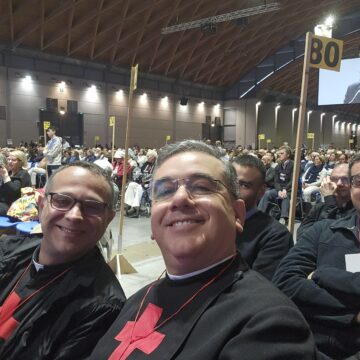
In the Shadow of the Spirit with the Heartbeat of St. Camillus

Gathering of the Superior Generals and General Councilors of the Camillian Religious Institutes
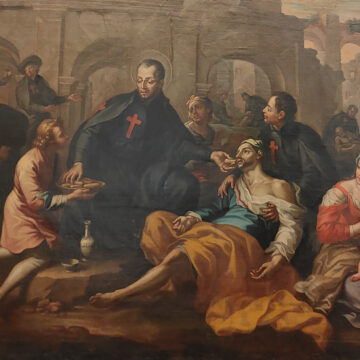
Day of the Camillian martyrs of charity: Message of the Superior General

General Assembly of the Camillian Delegation in France

A significant relic “returns home”!

XXVI Alzheimer’s Day

Inauguration of the Vi Hoang Elderly Care Home: “Love – Health – Happiness”

Saint Camillus de Lellis: A Legacy of Compassion and Service

Blessing and Opening of Daivalayam, a care home for children

Newsletter n.92 – Camillian world seen by Rome… and Rome seen by the world
Camillians on facebook.
San Camillo de Lellis
Camillians on Twitter
Camillians on instagram.
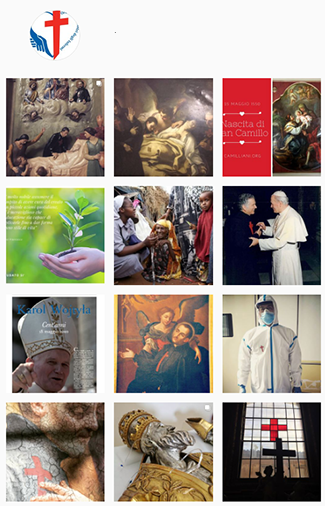
Activities of the Curia
HISTORICAL ARCHIVES
CAMILLIANI CAMILLIANS
THE LAY CAMILLIAN FAMILY
CAMILLIANUM
ONG SALUTE E SVILUPPO
Privacy overview.

25 Bible Verses About Visiting The Sick (With Commentary)
When a loved one falls ill, it’s natural to feel concerned and unsure about how to offer support. Luckily, the Bible provides guidance through verses that emphasize the importance of visiting the sick, offering comfort, and showing compassion. Let’s explore some of these comforting passages together.
Also Read: Bible Verses About Caring For The Sick And Elderly
Bible Verses About Visiting The Sick
James 5:14-15.
“Is anyone among you sick? Let them call the elders of the church to pray over them and anoint them with oil in the name of the Lord. And the prayer offered in faith will make the sick person well; the Lord will raise them up. If they have sinned, they will be forgiven.”
This verse emphasizes the importance of seeking spiritual support and prayer when one is sick. The act of calling upon the elders of the church signifies the communal aspect of faith, as the sick person is surrounded by the support and prayers of the community.
The anointing with oil symbolizes the healing power of the Holy Spirit and represents a physical reminder of God’s presence and love. This verse also highlights the connection between physical and spiritual healing, as praying in faith can bring about not only physical restoration but also forgiveness and spiritual renewal.
“The LORD sustains them on their sickbed and restores them from their bed of illness.”
God’s love and care extend to the sick, as expressed in this verse. It reminds us that even in times of illness, God provides sustenance and restoration. The image of being sustained on a sickbed suggests that God’s presence is a source of strength and healing even in moments of physical weakness.
This verse offers comfort and hope to those who are sick, assuring them that they are not alone in their suffering and that God is actively working to bring about their recovery and restoration.
Matthew 25:36
“I needed clothes and you clothed me, I was sick and you looked after me, I was in prison and you came to visit me.”
Jesus teaches the importance of compassionate care for the sick in this verse. It serves as a reminder that our actions towards those who are sick have a significant impact. By visiting and providing care, we demonstrate love and compassion, mirroring Jesus’ actions when He was on earth.
This verse challenges us to go beyond simple words of encouragement and actively engage in acts of service and support for the sick. It emphasizes the transformative power of our actions, as they have the potential to bring comfort, healing, and encouragement to those who are suffering.
Proverbs 17:22
“A cheerful heart is good medicine, but a crushed spirit dries up the bones.”
This verse highlights the impact of emotional and spiritual well-being on physical health. It emphasizes the connection between a cheerful heart and overall well-being, suggesting that a positive attitude and perspective can contribute to healing and wholeness.
In times of sickness, maintaining a joyful and positive outlook can have a profound effect on one’s recovery. It encourages us to cultivate a spirit of joy and gratitude even in the midst of illness, recognizing that a cheerful heart can bring about healing and restoration.
Psalm 103:2-3
“Praise the LORD, my soul, and forget not all his benefits— who forgives all your sins and heals all your diseases.”
This psalm exudes gratitude and praises God for His faithfulness and goodness. It reminds us to remember the many ways in which God has blessed us, including the forgiveness of sins and physical healing.
By acknowledging God’s role in our healing, we are encouraged to put our trust and hope in Him. This verse affirms that God has the power to heal all diseases, both physical and spiritual, and invites us to seek His healing touch in times of sickness.
Proverbs 4:20-22
“My son, pay attention to what I say; turn your ear to my words. Do not let them out of your sight, keep them within your heart; for they are life to those who find them and health to one’s whole body.”
This verse encourages us to heed and treasure God’s Word. By giving attention to His teachings and keeping them in our hearts, we find not only spiritual life but also health for our entire being.
God’s Word is a source of wisdom and guidance that directs us towards living healthy and wholesome lives. It provides principles and insights that contribute to physical, emotional, and mental well-being. This verse reminds us of the transformative power of God’s Word in bringing healing and wholeness to our lives.
Matthew 9:35
“Jesus went through all the towns and villages, teaching in their synagogues, proclaiming the good news of the kingdom and healing every disease and sickness.”
This verse portrays Jesus as the ultimate Healer and emphasizes His desire to bring healing to all areas of life. It highlights His compassionate ministry, addressing not only spiritual needs but also physical ailments.
Jesus’ healing ministry serves as an example for us to follow in caring for the sick. It reminds us of the holistic nature of our faith, encompassing both the spiritual and physical dimensions. Just as Jesus went out to heal and proclaim the good news, we are called to extend His healing touch to those who are sick through prayer, support, and acts of service.
Psalm 147:3
“He heals the brokenhearted and binds up their wounds.”
This psalm emphasizes God’s healing power, not only in physical ailments but also in emotional and mental anguish. It assures us that God is present in our brokenness and provides restoration and healing.
When visiting the sick, we must not only address physical needs but also acknowledge emotional and spiritual pain. Just as God binds up wounds, we are called to offer comfort, love, and support to those who are hurting. This verse encourages us to be agents of healing, bringing hope and restoration to the brokenhearted.
Jeremiah 33:6
“Nevertheless, I will bring health and healing to it; I will heal my people and will let them enjoy abundant peace and security.”
This verse reveals God’s promise of healing and peace. It reassures us that no matter the sickness or affliction, God is able to bring about restoration and wholeness.
When visiting the sick, we carry the hope and assurance of God’s healing power. Our presence and prayers are a reminder to those who are suffering that there is a God who cares and brings comfort and security. This verse encourages us to pray and believe for healing, trusting in God’s faithfulness and His ability to bring about abundant peace and well-being.
Isaiah 41:10
“So do not fear, for I am with you; do not be dismayed, for I am your God. I will strengthen you and help you; I will uphold you with my righteous right hand.”
This verse offers comfort and encouragement to those who are sick, assuring them of God’s presence and support. It reminds us that even in times of illness, we do not need to fear or be discouraged because God is with us.
When visiting the sick, we can share this verse as a reminder that they are not alone in their struggles. By affirming God’s promise of strength and help, we provide reassurance and foster faith in His ability to bring about healing and restoration.
“Have mercy on me, LORD, for I am faint; heal me, LORD, for my bones are in agony.”
This psalm reflects an honest cry for healing from the depths of physical and emotional pain. It highlights the vulnerability and desperation that often accompany sickness, acknowledging our need for God’s mercy and healing touch.
When visiting the sick, we can embrace their raw emotions and offer comfort and empathy. By listening to their pleas and joining them in prayer, we encourage them to bring their fears and pain before the Lord, who is compassionate and can bring relief and healing.
Isaiah 53:5
“But he was pierced for our transgressions, he was crushed for our iniquities; the punishment that brought us peace was on him, and by his wounds, we are healed.”
This verse points to the redemptive work of Jesus on the cross, where His wounds brought healing and peace to humanity. It reminds us that our spiritual and physical healing is made possible through His sacrificial love.
When visiting the sick, we can share this verse to inspire faith and trust in Jesus’ ability to heal. It encourages us to bring our infirmities and illnesses to Him, believing that His wounds can bring about transformative healing and restoration in our lives.
“Yes, my soul, finds rest in God; my hope comes from him.”
This psalm emphasizes finding rest and hope in God, even in the midst of sickness and challenges. It reminds us that our ultimate source of rest and hope is not in our circumstances but in God Himself.
When visiting the sick, we can encourage them to place their trust and hope in God’s faithfulness. By reminding them of His love and provision, we help them find a sense of peace and rest that transcends their physical condition.
Psalm 73:26
“My flesh and my heart may fail, but God is the strength of my heart and my portion forever.”
This verse acknowledges the frailty of our physical bodies and affirms God as our ultimate source of strength and sustenance. It reminds us that even when our bodies fail, God’s presence and strength remain constant.
When visiting the sick, we can remind them of this verse to instill faith and resilience. By pointing them to the eternal truth of God’s strength, we help them find courage and hope even in the face of physical weakness or pain.
1 Peter 2:24
“He himself bore our sins in his body on the cross so that we might die to sins and live for righteousness; by his wounds, you have been healed.”
This verse speaks of Jesus’ sacrifice on the cross, where His wounds brought about spiritual and physical healing. It emphasizes the transformative power of His atonement, enabling us to live righteous lives.
When visiting the sick, we can share this verse to remind them of Jesus’ redemptive work and His ability to bring healing. It encourages them to surrender their sufferings to Him, trusting that His wounds can bring about healing and restoration in all aspects of their lives.
2 Corinthians 12:9
“But he said to me, ‘My grace is sufficient for you, for my power is made perfect in weakness.’ Therefore I will boast all the more gladly about my weaknesses, so that Christ’s power may rest on me.”
Paul’s words in this verse affirm that God’s grace is sufficient, even in times of weakness and infirmity. It reveals that God’s power is often manifested most profoundly in our moments of vulnerability.
When visiting the sick, we can share this verse to inspire courage and trust in God’s grace. By embracing our limitations and acknowledging our need for Him, we allow His power to work through us, bringing comfort, strength, and healing to those who are sick.
Romans 8:26
“In the same way, the Spirit helps us in our weakness. We do not know what we ought to pray for, but the Spirit himself intercedes for us through wordless groans.”
This verse highlights the Holy Spirit’s role in our lives, particularly in times of weakness and uncertainty. It reassures us that the Spirit intercedes and prays on our behalf, even when we struggle to find the right words.
When visiting the sick, we can remind them of this verse to offer comfort and assurance. It encourages them to lean on the Spirit’s guidance and to trust in the power of His intercession on their behalf.
2 Timothy 4:20
“Erastus stayed in Corinth, and I left Trophimus sick in Miletus.”
This verse mentions one of Paul’s associates, Trophimus, who was sick and had to be left behind in Miletus. It serves as a reminder that sickness is a part of human experience, and not all illnesses are immediately healed.
When visiting the sick, it is important to acknowledge the reality that not everyone experiences immediate healing. We must be sensitive to their journey, providing support, prayer, and encouragement while trusting in God’s timing and purposes.
Acts 28:8-9
“His father was sick in bed, suffering from fever and dysentery. Paul went in to see him and, after prayer, placed his hands on him and healed him. When this had happened, the rest of the sick on the island came and were cured.”
This passage recounts an incident where Paul prayed for and healed Publius’ father, who was sick with fever and dysentery. The miraculous healing led to other sick individuals on the island seeking Paul’s help and experiencing their own healing.
When visiting the sick, we can draw inspiration from Paul’s example of prayer and laying on of hands. While recognizing that healing may not always come instantly, we can still intercede and offer our prayers, trusting in God’s power to bring about physical and spiritual restoration.
Matthew 10:7-8
“As you go, proclaim this message: ‘The kingdom of heaven has come near.’ Heal the sick, raise the dead, cleanse those who have leprosy, drive out demons. Freely you have received; freely give.”
Jesus’ instructions to His disciples in this passage entail proclaiming the good news of the kingdom of heaven while also ministering physical and spiritual healing. It demonstrates the integral connection between the message of the Gospel and acts of compassion and healing.
When visiting the sick, we can emulate Jesus’ teachings by sharing the message of hope and salvation while also offering our prayers and support for their physical well-being. This verse calls us to freely give what we have received from God, extending His love and compassion to those who are sick.
“…they will lay their hands on the sick, and they will recover.”
This verse is part of Jesus’ commission to His disciples, outlining the signs that will accompany those who believe in Him. It includes the laying on of hands as an act of faith that is often associated with healing and restoration.
When visiting the sick, we can follow this example by laying hands on them as a gesture of faith and prayer. While recognizing that healing ultimately comes from God, this act demonstrates our trust in His power and invites His intervention in the healing process.
Matthew 14:14
“When Jesus landed and saw a large crowd, he had compassion on them and healed their sick.”
This verse highlights Jesus’ compassion and His willingness to heal the sick. It showcases His deep love for humanity and His desire to address both the physical and spiritual needs of those who were hurting.
When visiting the sick, we are called to emulate Jesus’ compassion and extend His love to those who are suffering. By showing empathy, offering our prayers, and providing practical support, we become agents through which God’s healing touch is extended to the sick.
What Does the Bible Say About Visiting The Sick?
Visiting the sick is an important aspect of our Christian faith, as it reflects the love, compassion, and care that Christ calls us to embody. In the book of James, we are encouraged to visit and care for the sick as a demonstration of our faith in action (James 5:14-15). This passage exemplifies the importance of physical and spiritual care for those who are unwell.
Furthermore, in the Gospel of Matthew, Jesus teaches that when we visit the sick, we are in fact ministering to Him directly (Matthew 25:36). This highlights the profound spiritual significance and value that the act of visiting the sick holds in the eyes of God. It is an opportunity to show Christ-like love and kindness to our fellow human beings who are suffering.
In addition, the Bible emphasizes the power of prayer in the context of visiting the sick. James 5:16 encourages us to pray for one another, particularly for those who are sick, affirming that the prayer of a righteous person is powerful and effective.
Overall, the Bible teaches us that visiting the sick is an expression of love, compassion, and solidarity, and it is a way in which we can actively live out the gospel. It serves as a means of offering comfort, support, and spiritual nourishment to those who are facing illness and adversity.
Trending Topics:
- Say Kaddish Daily
- Passover 2024

How to Visit the Sick When You Can’t Visit the Sick
The biblical source of the commandment of bikkur cholim offers a clue.
By Rabbi Jason Weiner
What does God do when he visits Abraham? The text tells us only that God “appeared” to him. No comforting phrase is uttered, no wise teaching is shared — God simply appears. Which suggests to us that the central element of supporting those who are not well is just showing up — being there, fully present, along with the person in pain. The text validates the pain of feeling alone at a time of sickness and reminds us of the difference that can be made by the compassionate presence of another.
Of course, this isn’t always possible. Sometimes we are separated from those we wish to support by geography or other circumstances. At such times, it’s incumbent upon us to find other ways to show up, even if it’s not in person. Whether through social media, video conference, or plain old-fashioned phone calls, there are many ways we can create a sense of presence even without being in the same room with someone.
But there’s something more we can do as well, which is suggested later in the text. The story continues that after God’s visit, Abraham receives three more visitors, who our tradition understands to be angels , messengers of God. Jewish tradition teaches that angels are created for one singular purpose. But these angels seem to have accomplished multiple missions, visiting the sick and bringing a message to Abraham about the pending destruction of Sodom, where his nephew Lot lived, and then going to warn Lot.
The rabbis wonder: How can one angel have engaged in two separate missions? One answer is that seeking the welfare of Lot was part and parcel of visiting Abraham while he was sick. That is to say, part of alleviating Abraham’s pain was communicating to him not only that he was cared for, but that his nephew was as well.
Often we think that the mitzvah of bikkur cholim applies only to the patient. But illness often results in tremendous stress on an entire family. As lovely as it is to provide support for a patient, it can also be incredibly beneficial to the patient to offer support to their loved ones as well. Bikkur cholim can thus be fulfilled without even stepping foot in a patient’s room.
We learn from this story that to help those who are unwell is truly to walk in the ways of God, whether by finding ways to be present even when we can’t be in person or showing support to a patient’s family and larger social network. Sometimes it takes a little creativity to figure out the best way to do this. But thankfully our tradition provides us with the encouragement and models that can guide us in our pursuit of being a blessing to the world around us, no matter what struggles arise and no matter how unique and challenging the situation becomes.
Pronounced: MITZ-vuh or meetz-VAH, Origin: Hebrew, commandment, also used to mean good deed.
Pronounced: TALL-mud, Origin: Hebrew, the set of teachings and commentaries on the Torah that form the basis for Jewish law. Comprised of the Mishnah and the Gemara, it contains the opinions of thousands of rabbis from different periods in Jewish history.
Join Our Newsletter
Empower your Jewish discovery, daily
Discover More
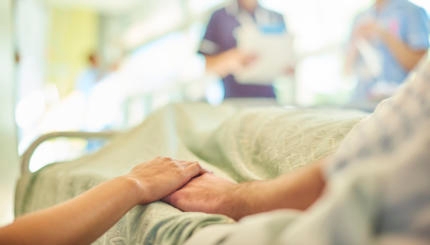
Jewish Prayer for the Sick: Mi Sheberach
A healing prayer for when a loved one is suffering.

Health & Wellness
What Are Jewish Genetic Diseases?
As many as 1 in 3 Ashkenazi Jews are estimated to be carriers for one of about 19 genetic diseases.

Beliefs & Practices
Abortion and Judaism
The Jewish position on abortion is nuanced, neither condoning it nor categorically prohibiting it.
76ers All-Star Joel Embiid says he was diagnosed with Bell's palsy before the playoffs started

PHILADELPHIA — Philadelphia 76ers All-Star center Joel Embiid has been diagnosed with Bell’s palsy, a form of facial paralysis he says has affected him since before the play-in tournament.
Embiid wore sunglasses to the podium after he scored 50 points in the Sixers’ Game 3 win over the New York Knicks and said he’s had various symptoms such as blurred vision and dry eyes.
Embiid said he first started suffering from the affliction about a “day or two” before the Sixers played the Miami Heat on April 17 in the play-in tournament. Embiid had 23 points and 15 rebounds in the win that sent the Sixers to the playoffs.
Embiid complained of migraines but “thought it was nothing” before he finally notified doctors he wasn’t feeling well.
More Sports from NBC News
- Bears take QB Caleb Williams No. 1 in NFL draft; Falcons shock with pick of QB Michael Penix Jr.
- Chicago Cubs pitcher forced to change glove because American flag patch was considered a distraction
- WNBA star A’ja Wilson weighs in on pro basketball gender pay gap: ‘It’s going to turn’
- Patriots owner says 'Jew hatred' on U.S. college campuses parallels Germany in 1930s and '40s
“My body was just, I was just not feeling it,” Embiid said. “Yes, it’s pretty annoying. My left side of my face, my mouth and my eye. It’s been tough. But I’m not a quitter. I’m going to keep fighting through anything. It’s unfortunate, that’s the way I look at it. But it’s not an excuse. I’ve got to keep pushing.”
Last season’s NBA MVP, Embiid was 13 of 19 from the floor, made 19 of 21 free throws and hit five 3-pointers in Game 3.
The Knicks lead the series 2-1 and Game 4 is Sunday in Philadelphia.
Embiid had been wearing sunglasses throughout the series and conducted a Game 2 postgame interview with his head down in front of his locker to hide his symptoms.
Embiid said he has no timetable on how long it make take to recover from Bell’s palsy.
“It hasn’t really necessarily gotten better,” he said. “With the conversations that I’ve had, it could be weeks, it could be months. I just hope that it stays like this. I’ve got a beautiful face. I don’t like when my mouth is looking the other way. Unfortunate situation but everything happens for a reason.”

IMAGES
VIDEO
COMMENTS
What we see in the life of Mother Teresa is a shining example of a life dedicated especially to practicing the corporal works of mercy: (1) Feed the hungry. (2) Give drink to the thirsty. (3) Clothe the naked. (4) Shelter the homeless. (5) Visit those in prison. (6) Comfort the sick. (7) Bury the dead.
visit the sick. Those who are sick are often forgotten or avoided. In spite of their illness, these individuals still have much to offer to those who take the time to visit and comfort them. Give blood; Spend time volunteering at a nursing home - Get creative and make use of your talents (e.g. sing, read, paint, call Bingo, etc.)!
If we wish to be welcomed into the Kingdom of Heaven, it would be a good thing for us to be mindful of those who suffer, and to make time to visit and comfort them. We have many examples of Saints who excelled in their loving care for the sick and suffering: St. Frances of Rome, St. Elizabeth of Hungary, St. Hedwig, St. Damian of Molokai, St ...
Visit the Sick. Sometimes we can get squeamish about being around hospitals or nursing homes, but this work of mercy invites us to visit someone who is in the hospital or is housebound. The touch of a hand, a hug and real eye contact are great healers to the human spirit. Visiting the sick can be challenging for those of us who are healthy, and ...
Visiting the sick, one of the corporal works of mercy, can also involve some of the spiritual works of mercy. You may have to counsel a person who is doubtful, instruct a person who is ignorant of God's love or the value of suffering, or comfort a person who is sorrowful. You will pray for the people you visit while they are living and after ...
If the sick consider their sins to be light and trivial, teach them of the justice of God and call them to embrace the mercy of Christ. If the sick are afflicted in their consciences, help them find rest in Christ. Don't be afraid to bring some small token of physical relief—books, flowers, balloons, games, movies, a homemade card.
Well, my good friend, Brian Croft, the faithful pastor of Auburndale Baptist Church in Louisville, KY, has written a very practical and helpful book called Visit the Sick: Ministering God's Grace in Times of Illness. In a short 128 pages, and with highly readable style, Brian covers all the ground: biblical, theological, pastoral and practical.
That pope was St. John Paul II, who throughout his life emphasized the habit of "visiting the sick.". He is an inspiration to me and challenges us all to renew our own efforts in performing ...
Many sick people experience the loneliness of abandonment from relatives and others who do not want to be reminded of their own mortality. Christ calls us to 'visit the sick' and care for them as an essential part of our Christian mission of love and compassion. Hence the crucial role the Church played in establishing hospitals and the ...
For example, some may require particular tact, prudence, or knowledge. Similarly to instruct the ignorant, counsel the doubtful, and console the sorrowing is not always within the competency of every one. ... To visit the sick. To visit the imprisoned, or ransom the captive. To bury the dead. Spiritual works of mercy.
Visiting the sick. Visiting the sick, either at hospital or their home, is a recommended philanthropic deed in different cultures and religions, including Christianity, [1] Judaism [2] and Islam [3] and is considered an aspect of benevolence and a work of mercy. In Judaism, for instance, the act is called bikur cholim and is considered a part ...
Corporal Works of Mercy: Visit the sick. Spirituality. This story appears in the Works of Mercy feature series. View the full series. A visitor comforts a young earthquake victim outside a ...
How many sick and elderly people are living at home and waiting for a visit! The ministry of consolation is a task for every baptized person, mindful of the word of Jesus: "I was sick and you ...
Visiting the sick literally is the most obvious way to do this, but we can uphold the dignity of those who are sick with other less predictable ways, too. There are more chances than you might think to perform the corporal work of mercy to visit the sick. Every day someone is sick—your family, your roommate, your friend, your neighbor, a ...
Matthew 25:36. Verse Concepts. naked, and you clothed Me; I was sick, and you visited Me; I was in prison, and you came to Me.'. James 1:27. Verse Concepts. Pure and undefiled religion in the sight of our God and Father is this: to visit orphans and widows in their distress, and to keep oneself unstained by the world. 2 Kings 8:29.
1. God calls us to be servants. Visiting the sick and the dying reminds us that we have been called by God to be servants to those in need. There is no glory in the hospital room. There is no public adulation--no praise of man by the bedside of the sick. There is no room for boasting when you are sitting by the side of those who are fearful for ...
The Bible itself, however, warns us about visits to the sick that are hypocritical or counter-productive. First and foremost, Psalm 41 begins by praising those who visit the sick: 'Happy are those who are concerned for the poor; the Lord will help them when they are in trouble', but immediately afterwards narrates to us the complaints of a sick ...
Matthew 25:36. "I needed clothes and you clothed me, I was sick and you looked after me, I was in prison and you came to visit me.". Jesus teaches the importance of compassionate care for the sick in this verse. It serves as a reminder that our actions towards those who are sick have a significant impact.
1. It is Known as Bikur Cholim. Visiting the sick is a fundamental Jewish value. The Hebrew term for visiting the sick is bikur cholim. (Among Ashkenazi Jews, this is pronounced BICK-er KHO-lim. In Modern Hebrew, it sounds more like bee-KOOR kho-LEEM.) 2. Visiting the Sick Is a Mitzvah. Your presence and smile can go a long way in helping the ...
Give an example of how you can help others using the seven corporal works of mercy below. 1. Feed the hungry Example: 2. Give drink to the thirsty Example: 3. Clothe the naked Example: 4. Shelter the homeless Example: 5. Visit the sick Example: 6. Visit the prisoners Example: 7. Bury the dead Example: WEEK 1 VISIT THE PRISONERS Activity Sheet ...
The commandment of visiting the sick (bikkur cholim) (בִּקּוּר חוֹלִים) is a very great good deed. Concerning this mitzvah, the Mishnah states that this is one of those actions of which one "eats of its fruits" in this world, and retains the "principle" in the next world.. According to certain opinions, this is a biblical mitzvah, based upon the verse "And you shall ...
The patient's room is a holy place. While there, say a short prayer for a speedy recovery, such as, "May G‑d care for you amongst all the patients of Israel .". Or, on Shabbat, "On Shabbat it is forbidden to plead, but healing is soon to come.". When you leave, say a psalm or other prayer. It is traditional to ask a holy person to ...
Donate. The Talmud says that the first fulfillment of the commandment to visit the sick, or bikkur cholimin Hebrew, is in the book of Genesis, when God comes to visit Abraham after his circumcision. Abraham was 99 years old when he circumcised himself and he was in considerable pain three days later when God paid him a visit.
The sick cows, said Petersen, who owns Sunrise Veterinary Service, tended to produce milk that didn't look quite right, and had mastitis, an inflammation of the udders.
Philadelphia 76ers All-Star center Joel Embiid has been diagnosed with Bell's palsy, a form of facial paralysis he says has affected him since before the play-in tournament.
Prince Harry and his wife Meghan will visit Nigeria in May for talks on the Invictus Games, which he founded to aid the rehabilitation of wounded and sick service members and veterans, a Nigerian offi